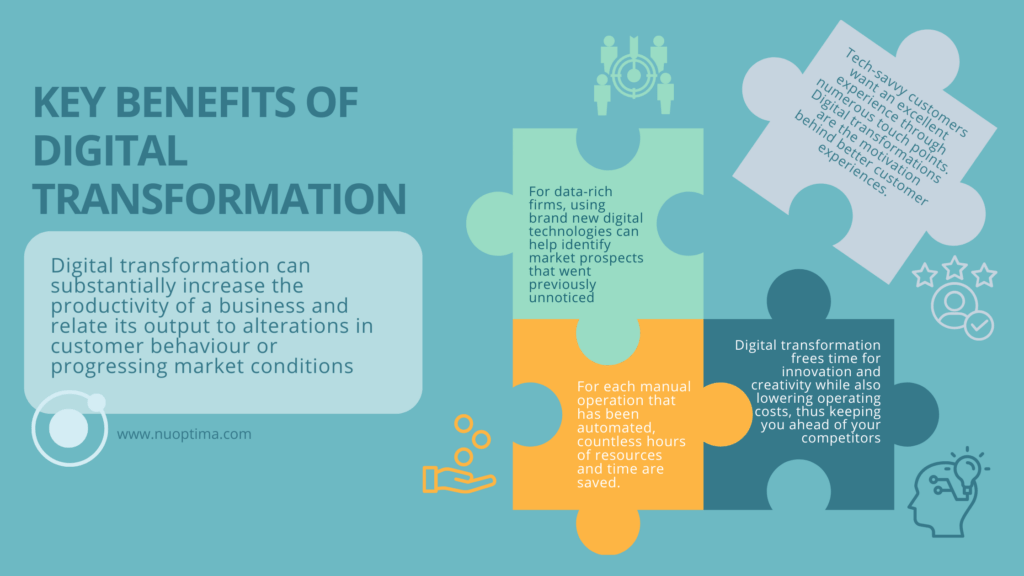Key Points
- Digital transformation is the act of using digital technologies to make new or alter already existing business processes, customer experiences, and culture to meet the shifting business and market necessities. It is the redefinition of business in this digital age.
- Digital transformation is important because it lets businesses adapt to constantly changing industries and consistently improve the ways in which they operate. It helps your business evolve to stay competitive and relevant within your industry.
- Key benefits of digital transformation include improving the efficiency of a business, allowing further time for innovation and creativity while decreasing operating costs, and improving the customer experience.
- Digital transformation can be an intimidating task. For this reason, many businesses choose to find third-party assistance. Book a free discovery call with NUOPTIMA today to discover how digital transformation can be used to assist your business.
What is Digital Transformation? A Definition
Digital transformation is defined as the act of utilising digital technologies to create new (or alter existing) business processes, culture, and customer experiences in order to meet the shifting business and market necessities. Essentially, digital transformation is the redefinition of business within the digital age.
It goes beyond customary functions, such as sales, customer service, and marketing. Rather, digital transformation revolves around your relationship with customers. Moving from traditional pen and paper to innovative applications that assist you in managing your company, there is an opportunity to reconsider how you conduct your business, as well as interact with customers, with the benefit of digital technology.
For small businesses launching, you do not need to construct business processes and adapt them further down the road. Instead, you can protect your organisation for the future from the very beginning. It is easy to see in this modern age that handwritten data is no longer supportable. Building digitally allows your company to be malleable and ready to expand.
Digital transformation’s goal is to adapt organisations so that:
- Your business has increased scalability in reply to shifting market conditions.
- Your business has better sensitivity to the needs of clients. It substantially improves how companies serve their customers.
- Customers can benefit from better convenience and organisation.
A key point to remember is that digital transformation entails understanding your technology’s potential. Instead of asking questions about how much faster you can do things the same way, consider what your technology is actually capable of and how your company and its processes can be adapted to make the most of your technology investments.
Why is Digital Transformation Important?
Every digital transformation initiative will have its individual goals, but the primary purpose is always to improve the current processes you use. Digital transformation is important as businesses have to evolve to stay competitive within their industry. If you fail to evolve, you will end up left behind. A key strategy that sets industry leaders apart is that they invest more money in transforming their businesses rather than only focusing on running them. Digital transformations let companies adapt to constantly changing industries and consistently improve the ways in which they operate.
For companies, this means continually looking for ways to improve the end-user experience. For instance, this could involve tactics such as leveraging artificial intelligence, migrating data to cloud services, and offering better on-demand training.

Key Benefits of Digital Transformation
As digital technology evolved, new ideas were generated regarding using business technology in fresh ways. This was when digital transformation began to form. With new technologies, new things and new strategies for doing them suddenly became possible. Digital transformation can substantially increase the productivity of a business and relate its output to alterations in customer behaviour or progressing market conditions. Below are some of the biggest benefits of digital transformation:
- For firms that are data-rich, using brand new digital technologies can help identify market prospects that went previously unnoticed.
- Digital transformation substantially improves how efficient a business is. For each manual operation that has been automated, countless hours of resources and time are saved. This allows them to put their attention instead on more mission-critical tasks. For instance, with enterprises, time and money spent on updating digital resources and training new employees can quickly become unmanageable. But by using the proper tools, costs can be kept to a minimum, and productivity can improve.
- Moving to digital allows further time for innovation and creativity while also lowering operating costs. It drives innovation and therefore keeps you ahead of your competitors. Bear in mind that your competition will be investigating digital transformation whether you are or not. By making the choice not to use digital transformation for your business, you essentially chose to be left behind. This is why you should invest in your organisation’s future.
- It improves the customer experience. For tech-savvy customers, they want an excellent experience through numerous touchpoints, such as social media, mobile applications, live chat, and email. Digital transformations are the motivation behind better customer experiences. Indeed, it has allowed businesses to take a step back and review everything they do, including customer interactions online and in person.
Examples of Digital Transformation
Netflix
A great example of how a company has created smart and effective ways of leveraging tech is Netflix. While it began as a mail-order service (and quickly disrupted the brick-and-mortar shop-style video rental business), Netflix then used digital innovations to allow wide-scale streaming video. To this day, it is a strong competitor against cable television and traditional broadcasting networks because it offers a formidable library of on-demand content at appealing prices. Netflix is also now able to gain unprecedented insight into viewing habits and uses this data to inform its decisions, including the user experience. This demonstrates digital transformation in action at its very best, taking advantage of technologies available to inform how a business is run.
Online Tax Payment
Traditionally, tax filing was known to be a very paper-intensive process. It required significant manual input time from the taxpayers, as well as substantial manual processing time from government agencies. However, in recent years throughout most of Europe, there has been a sudden trend toward tax digitisation. In the United Kingdom, for instance, a specific digital transformation team has been accepted. It now means the new paper-free experience is simple and accessible for people of all ethnicities and ages.
Modify Your Business to Leverage Digital Transformation
It is prudent to consider adapting your business to leverage digital transformation seriously. For one thing, digital transformation has reshaped how businesses tackle customer service. Originally, customers would have to seek you out, either by phoning or in person. But, social media and its colossal rise has changed customer service drastically, as well as advertising, marketing, and sales. Forward-thinking businesses embrace social media as an opportunity to offer their services by meeting customers on online platforms of their choosing. It has become an extra channel to offer a superior customer experience. Real transformation occurs when you consider all available technologies and determine how adapting your company to them can give customers an improved experience.
But, digital transformation is not just about social media and customer service. It also encourages businesses to reevaluate everything, including established ideas of departments and teams. This can mean the removal of walls between different departments. For example, your social media presence can include both service and marketing, which is put together by a digital platform that gains customer data, makes personalised journeys, and sends customer queries to your service employees.
Digital transformation is crucial if you wish to stay relevant in this modern digital age. It improves efficiency, creativity, and productivity while at the same time decreasing operating costs. It also enhances the customer experience. It is essential that you plan for a digital future.
Digital transformation offers outstanding opportunities in virtually all industries, but it can be a difficult and intimidating task. For this reason, many companies choose to enlist the help of a third party to assist them in this transformation. If you would like to learn more, book a free consultation call with NUOPTIMA today to discover more about digital transformation and how it can be used to enhance your business.



